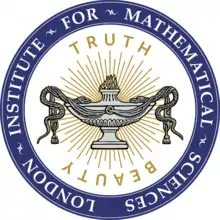London Institute for Mathematical Sciences
The London Institute (officially the London Institute for Mathematical Sciences) is a private research centre in London that conducts research in physics, mathematics and the theoretical sciences. The Institute does not do experiments. It does not award degrees and there are no teaching or administrative duties.
| Motto | Truth, Beauty |
|---|---|
| Type | Private research institute |
| Established | 2011 |
| Location | Mayfair, London, UK |
| Website | lims |
 | |
History
The London Institute was founded in 2011 when it became a registered charity. It was conceived as a research centre where scientists could focus full-time on fundamental theoretical research, unencumbered by teaching and other duties.[1] Its first research grant was from the Defense Advanced Research Projects Agency.[2]
In 2019, the London Institute was awarded Independent Research Organisation status by the Engineering and Physical Sciences Research Council.[3] It is the UK's first private research centre in the physical sciences to be allowed to compete with universities for funding from the seven Research Councils.[4]
For a decade, the Institute occupied a Grade II* listed Georgian townhouse in Mayfair, London.In 2021, the Institute moved into rooms at the Royal Institution of Great Britain, where Sir Humphry Davy identified nine new elements in the periodic table and Michael Faraday uncoverered the fundamental principles of electromagnetism.[5]
Organisation
The Director of the London Institute is the physicist Thomas Fink. Its Board of Trustees includes Sir Roy Anderson, FRS, former chief scientist at the Ministry of Defence; Sir John Beddington, FRS, recently the UK government's chief scientific adviser; and Martin Reeves, Global Director at Boston Consulting Group.
Former members of the Board of Trustees include Sir Peter Williams, FRS; Baroness Meyer; physicist Luciano Pietronero; Dame Shirley Porter; and physicist Tom Tombrello.
The Institute avoids traditional departmental boundaries between academic disciplines, so research draws on multidisciplinary knowledge. Scientists and non-scientists are not segregated but work closely together, so everyone is involved in funding, carrying out and communicating discoveries.[6]
In early 2021, the UK government announced the launch of its new science agency, ARIA, to support projects that may create “a paradigm shift in science”. As a roadmap for the new agency, the London Institute compiled a list of the 23 Mathematical Challenges of our time.[7] Ranging from the Riemann Hypothesis to the quest for AI and the problem of mortality, they serve as a reminder not only to ARIA, but to the whole scientific community, to aim high.
Research
The London Institute does research in theoretical physics, mathematics and the mathematical sciences. It does not have laboratories and does not conduct experiments. Research at the London Institute spans five themes: Mathematics that unifies; The elegant universe; Life, learning and emergence; Tomorrow’s technology; and the Theory of human enterprise.[8]
In an article in The Spectator in 2021, the Institute outlined the areas of research it is working on, which comprise the “challenges of tomorrow, for which we must find solutions today”. These include teaching computers to uncover new theorems; identifying the mathematical structure of innovation; making neural computing practicable; building a platform for collective creativity; harvesting energy from fluctuations in the environment; and unravelling ageing and mortality.[9]
Funding
The London Institute is funded by research grants from the EU's Horizon 2020, the European Innovation Council, DARPA, the US Department of Defense, the Ministry of Defence, the Medical Research Council and Cancer Research UK.
Events
In June 2021, the London Institute compiled its list of the 23 Mathematical Challenges[10] of our time. Inspired by David Hilbert’s list of 23 challenges, 17 of which have been solved or partially resolved, the new list was intended as reminder to mathematicians to aim high. It was published in full in The Times.[11]
In October 2021, London Institute Fellows Thomas Fink and Yang-Hui He spoke to Nobel Laureate Sir Roger Penrose in the Royal Institution's Lecture Theatre about his life and work.[12] In December 2021, Professor He gave a talk in the Lecture Theatre about the Theory of Everything.[13]
In March 2022, Dr Mark Kotter, whose company bit.bio collaborates with the Institute, spoke in the Lecture Theatre about the cell programming revolution.
References
- "How British science can flourish". The Spectator. Mar 2020.
- "Unwinding nature's clocks, with $14 million from DARPA". EurekaAlert!, The American Association for the Advancement of Science. Mar 2012.
- "Independent Research Organisations". UK Research and Innovation.
- "'We need to challenge the university monopoly on research'". Times Higher Education. Apr 2019.
- "Building". London Institute for Mathematical Sciences. Retrieved 21 March 2022.
- "Sage of Discovery". Business Life, British Airways. Apr 2019.
- "23 Mathematical challenges". The Times. Jun 2021.
- "Research themes". London Institute for Mathematical Sciences.
- "How Boris's research agency can thrive". The Spectator. Mar 2021.
- "23 Mathematical challenges". LIMS - London Institute for Mathematical Sciences. Retrieved 2022-03-14.
- Editor, Tom Whipple, Science. "Mathematicians sum up the 23 big problems of our time". ISSN 0140-0460. Retrieved 2022-03-14.
{{cite news}}:|last=has generic name (help) - "In Conversation with Roger Penrose". Youtube. Oct 2021.
- "Theory of Everything". Youtube. Dec 2021.